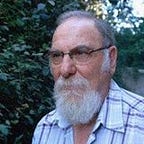Maria Luise Kaschnitz > Hiroshima
(Translated from German by Garland Richmond) y mi traducción del inglés
The man who threw death down on Hiroshima
Joined a cloister, rings the bells there now.
The man who threw death down on Hiroshima
Jumped in a noose from a stool
And strangled himself.
The man who threw death down on Hiroshima
Went out of his mind, fends off ghosts,
Hundreds of thousands, who come at him nightly,
Resurrected from the dust just for him.
None of that is true.
Not long ago I saw him
In the garden of his house in the suburbs.
The hedges were still young and the rose bushes delicate,
Things don’t grow fast enough for him to hide
In the forest of forgetting. Plain to see was
The naked suburban house, the young wife
Standing beside him in her flowered dress,
Holding the little girl’s hand,
The boy, sitting on the man’s back,
Swinging the whip over his head.
He himself was recognizable
On all fours on the plot of grass, his face
Contorted in laughter, because the photographer
Stood behind the hedge, the eye of the world.
Maria Luise Kaschnitz > Hiroshima
El hombre que arrojó la muerte sobre Hiroshima
ingresó al claustro, ahora hace tañer las campanas.
El hombre que arrojó la muerte sobre Hiroshima
saltó del banquillo con la soga al cuello
y se estranguló.
El hombre que arrojó la muerte sobre Hiroshima
ha enloquecido, esquiva los fantasmas,
cientos de miles, que le vienen a la noche,
renacidos del polvo sólo para él.
Nada de esto es verdad.
Hace poco lo vi
en el jardín de su casa en los suburbios.
Los setos todavía jóvenes, los rosales delicados,
las cosas no crecen tan rápido como para que pueda ocultarse
en el bosque del olvido. Era fácil ver
la desnuda casa suburbana , la joven esposa
a su lado con su vestido floreado ,
tomando de la mano a una niña pequeña,
el niño montado sobre la espalda del hombre,
restallando el rebenque por encima de su cabeza.
El hombre era reconocible,
andaba a gatas sobre el césped, el rostro
contorsionado de risa, porque el fotógrafo
estaba detrás de los setos, como ojo del mundo.
